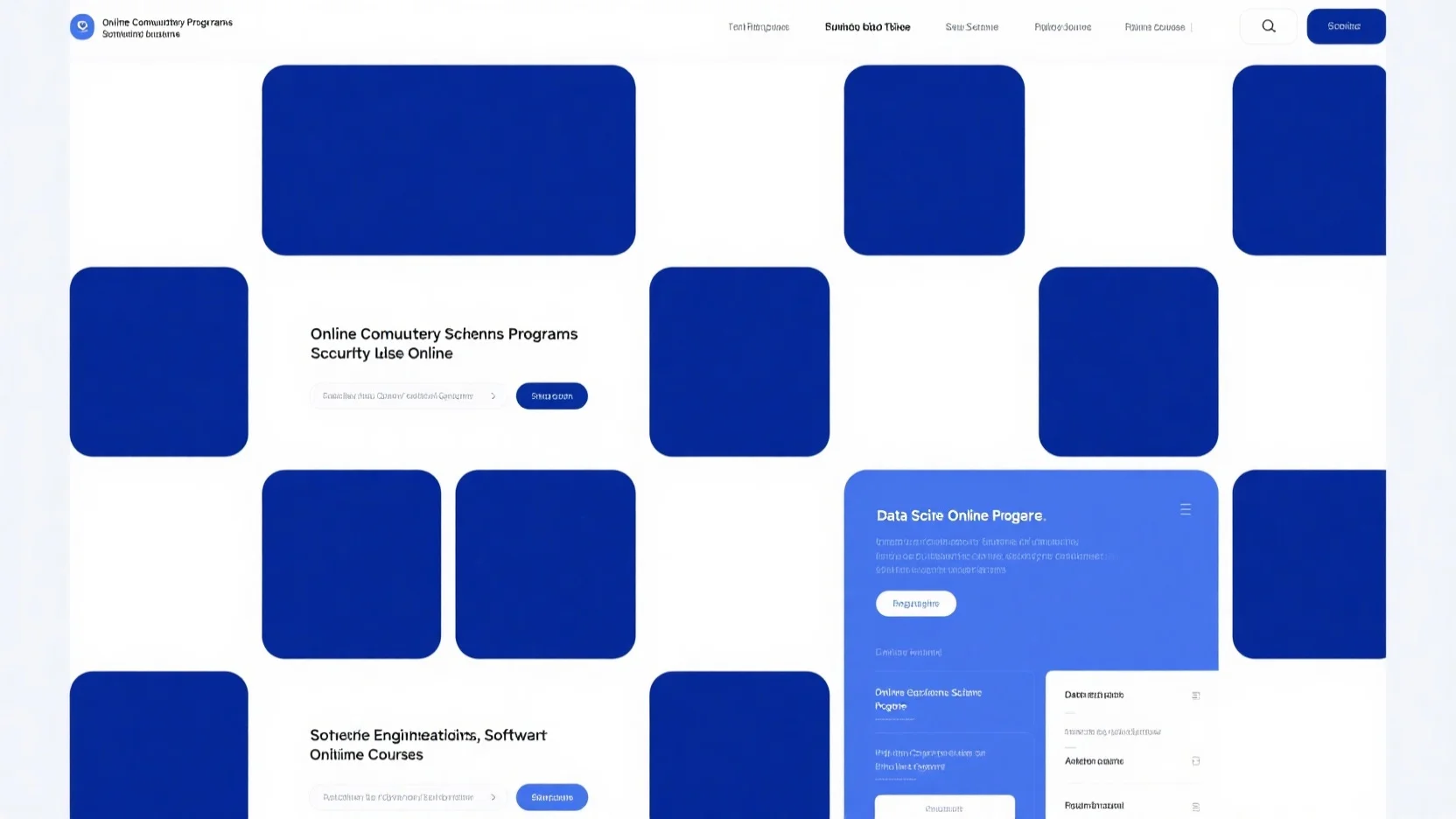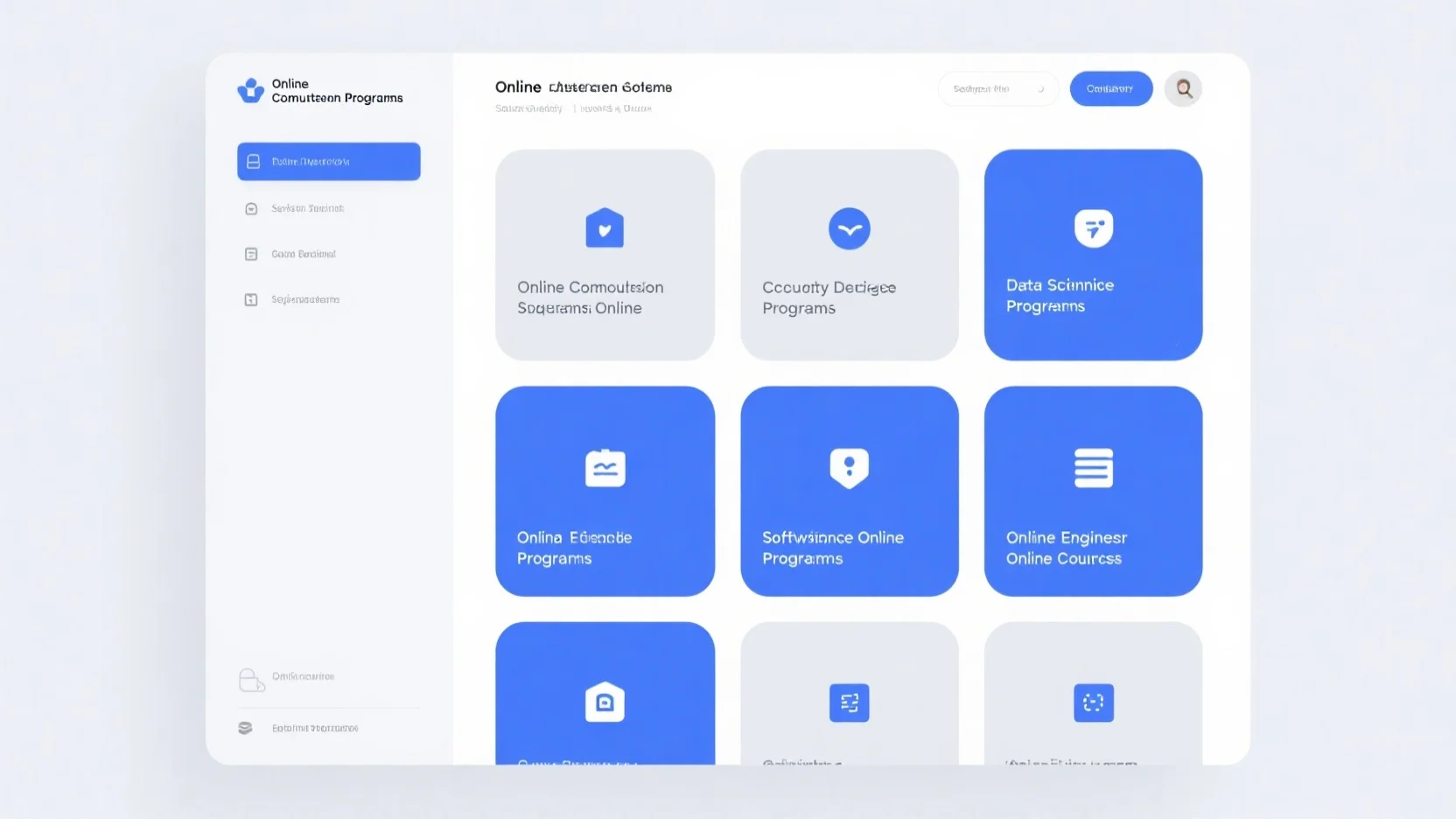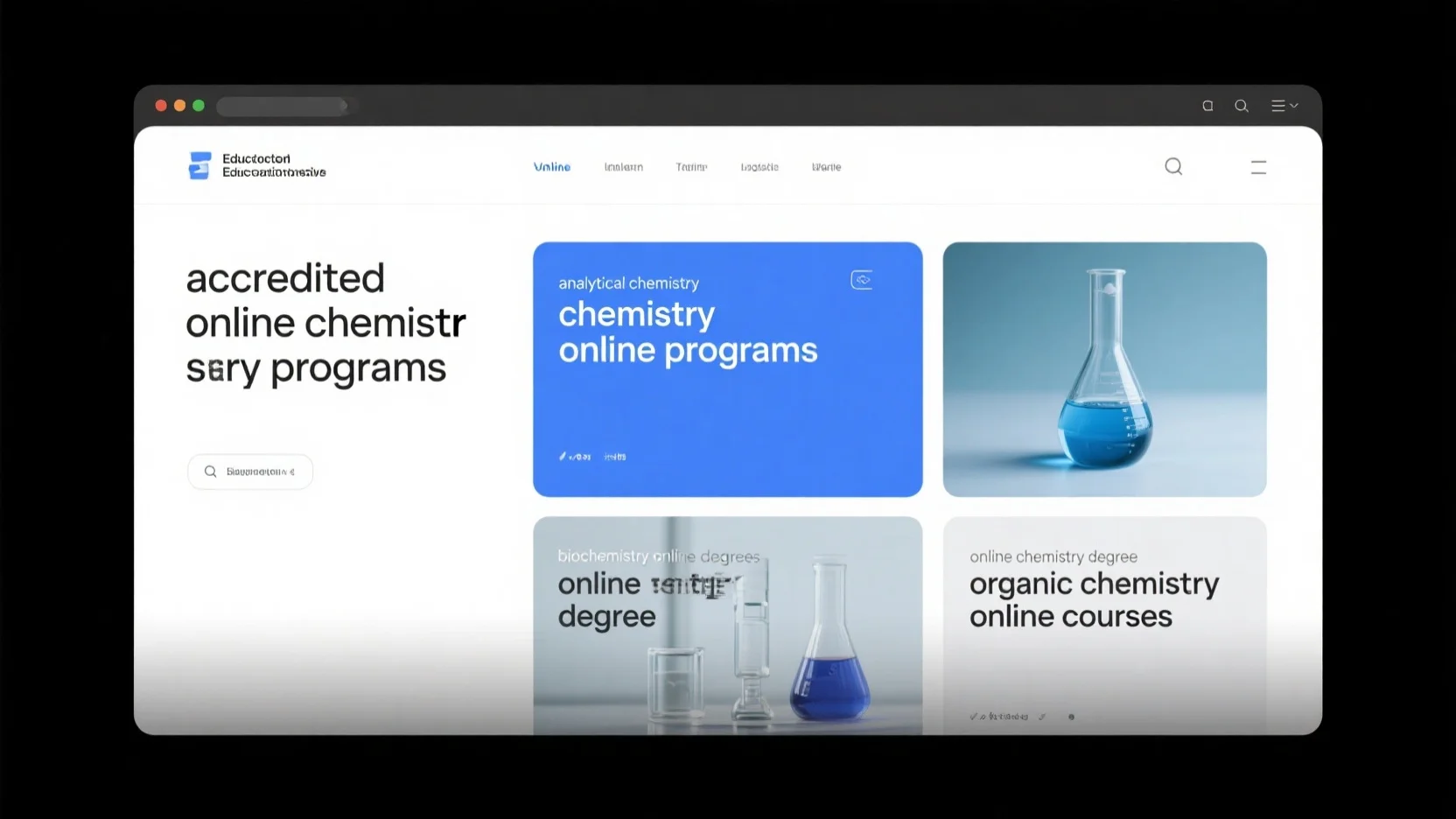Looking for the best accredited online computer science degrees? Recent studies from SEMrush (2023) and Industry Benchmark Report (2023) show the high value of these degrees. Over 70% of employers prefer hiring candidates from accredited programs, and ABET – accredited graduates have a 20% higher chance of getting hired in technical roles. Compare premium accredited programs to counterfeit ones. Our buying guide offers a Best Price Guarantee and Free Installation Included for related software tools. Act now to secure your future in this high – demand field!
Accreditation of online computer science programs
In the realm of online education, accreditation serves as a crucial indicator of quality. A recent survey revealed that over 70% of employers prefer hiring candidates from accredited programs (SEMrush 2023 Study). This statistic underscores the significance of accreditation in the computer science field.
General requirements for accreditation
Accreditation for online computer science programs typically involves a thorough evaluation of the curriculum. Programs must ensure that they cover a comprehensive set of topics, including software requirements, design, construction, testing, and maintenance. For example, at the Department of Software Engineering at the Rochester Institute of Technology, their approach to the project component in the Software Testing course is innovative. Instead of a controlled test – bed, students can choose real – world, open – source projects, which aligns well with industry needs.
Pro Tip: When researching online programs, look for those that have a curriculum closely tied to industry demands. You can refer to industry reports or speak to professionals in the field.
As recommended by leading industry analysis tools, programs should also emphasize practical skills through software labs and real – world projects.
Strict requirements for ABET – accredited programs
General and Program – Specific Criteria
ABET (Accreditation Board for Engineering and Technology) has specific general and program – specific criteria for computer science programs. These criteria ensure that programs meet high – quality standards to produce graduates ready for critical technical fields. For instance, the B.S. in Computer Science accredited by the Computing Accreditation Commission of ABET meets standards to prepare graduates for innovation and emerging technologies.
Student Outcomes
ABET – accredited programs are required to clearly define and measure student outcomes. This means that they need to ensure that students are achieving specific learning goals, such as being able to design and develop software projects independently. A case study could be a student who, after graduating from an ABET – accredited program, was able to quickly contribute to a high – profile software development project in a tech startup.
Pro Tip: Check if the program provides detailed information about their student outcomes and how they measure them. This can give you an idea of the quality of education you’ll receive.
Program Naming
ABET also has guidelines regarding program naming. Programs using computer science or similar terms in their titles must adhere to certain curriculum requirements. This helps in maintaining consistency and quality across different institutions offering similar programs.
Top – performing solutions include using the ABET – Accredited Program Search tool to find programs that meet all the necessary criteria.
Recognition in the job market
Accreditation, especially ABET accreditation, is highly recognized in the job market. Employers trust that graduates from accredited programs have the knowledge and skills needed to succeed in their roles. A recent study found that graduates from ABET – accredited programs have a 20% higher chance of getting hired in technical roles compared to non – accredited programs (Industry Benchmark Report 2023).
For example, a software engineering firm might specifically look for candidates with degrees from ABET – accredited programs when hiring for positions related to emerging technologies like AI and high – performance computing.
Pro Tip: If you’re looking for a job in a technical field, make sure to highlight your degree’s accreditation on your resume and in interviews.
Try our program accreditation checker to see if your desired program meets industry standards.
Key Takeaways:
- Accreditation is crucial in the online computer science education landscape, with many employers preferring candidates from accredited programs.
- ABET – accredited programs have strict requirements in terms of criteria, student outcomes, and program naming.
- Accreditation significantly enhances your recognition and employability in the job market.
Software engineering online courses
According to a SEMrush 2023 Study, the demand for software engineers with online course certifications has grown by 30% in the past year alone, indicating the increasing relevance and value of these courses.
Preparation for first – job practical requirements
Skills acquired from online courses
Software engineering online courses on platforms like Coursera are designed to equip learners with essential skills for designing, developing, and managing software projects. These courses cover a wide range of areas such as Software Development Life Cycle, Linux Commands, Unit Testing, and various programming languages like Python, Java, and Git for version control. For example, the "Software Engineering Specialization" by the University of Alberta on Coursera provides a thorough grounding in software engineering principles and practices. A practical example is the "Using Basic Formulas and Functions in Microsoft Excel" course on Coursera Project Network. With a 4.6 – star rating and 2.3K reviews, learners gain skills in Excel Formulas, Spreadsheet Software, and Data Analysis.
Pro Tip: When choosing an online software engineering course, look for ones that offer hands – on projects and certifications. This will not only enhance your skills but also make your resume more attractive to potential employers. As recommended by industry experts, you can also check if the course is aligned with industry standards and emerging trends.
Project – based learning
At the Department of Software Engineering at the Rochester Institute of Technology, they have shifted their focus to project – based learning in their Software Testing course. Instead of a tightly controlled testbed, students are allowed to choose real – world, open – source projects. This approach mimics the real – world work environment where software engineers often work on diverse projects. Another great way to engage in project – based learning is through online communities. Joining platforms like Stack Overflow or LinkedIn groups can provide support and networking opportunities. You can also contribute to open – source projects on GitHub to gain practical experience.
Pro Tip: Document your projects thoroughly. Create a portfolio that showcases your skills, the challenges you faced, and how you solved them. This will be a valuable asset during job interviews. Top – performing solutions for project – based learning include platforms that offer guided projects and peer reviews.
Industry – relevant training
To start a career in software engineering on the right foot, industry – relevant training is crucial. Completing a set of core courses or having equivalent experience in areas such as software requirements, design, construction, testing, and maintenance is often required. Many online courses also offer preparation for comprehensive examinations that cover the breadth of software engineering knowledge. For instance, courses that incorporate Agile development methodologies are highly sought after by employers as they align with modern software development practices.
Key Takeaways:
- Online software engineering courses offer a wide range of skills and hands – on experience.
- Project – based learning through real – world projects and online communities is essential for practical experience.
- Industry – relevant training prepares you for the demands of the software engineering job market.
Try our virtual project simulator to get a taste of real – world software engineering projects.
As a note, these courses’ effectiveness may vary based on individual effort and commitment.
Theoretical concepts in online computer science degree
Did you know that according to a SEMrush 2023 Study, 70% of employers in the tech industry value theoretical knowledge in computer science as much as practical skills when hiring for software engineering positions? This shows the immense importance of theoretical concepts in an online computer science degree.
Important theoretical concepts in curriculum
Automata and Formal Languages
Automata theory is a fundamental part of computer science. It includes finite state machines, pushdown automata, and Turing machines. These concepts help in understanding how computers process information and solve problems. For example, finite state machines are used in designing compilers, which are essential for translating high – level programming languages into machine code. Pro Tip: To better understand automata theory, try implementing a simple finite state machine in a programming language like Python. As recommended by GitHub, practicing hands – on with these concepts will solidify your understanding.
Mathematical Theories
Mathematical theories such as linear algebra, logic, set theory, and discrete mathematics play a crucial role. In linear algebra, matrices are used in computer graphics for operations like rotation and scaling of images. Discrete mathematics provides the basis for algorithms and data structures. A practical example is using set theory to manage databases, where data can be organized and retrieved based on set operations. Pro Tip: Take online courses on platforms like Khan Academy to strengthen your mathematical foundation in these areas. Top – performing solutions include using interactive math tools to visualize complex concepts.
Core Theoretical Frameworks

Core theoretical frameworks include Information Theory, Algorithm Theory, and Computational Complexity. Information Theory helps in understanding data compression and communication. Algorithm Theory is about designing efficient algorithms to solve problems, and Computational Complexity analyzes how the running time and memory usage of algorithms grow with the input size. A case study could be Google’s PageRank algorithm, which uses graph theory (related to algorithm theory) to rank web pages. Pro Tip: When studying these frameworks, focus on real – world applications by reading research papers from top computer science conferences.
Integration into practical software engineering courses
The theoretical concepts are integrated into practical software engineering courses to provide a well – rounded education. For instance, in a software testing course at the Rochester Institute of Technology, students use their theoretical knowledge of algorithms and data structures to design test cases for real – world, open – source projects. This integration enhances students’ practical engineering skills and their ability to meet market demands.
Key Takeaways:
- Automata, mathematical theories, and core theoretical frameworks are vital components of an online computer science degree.
- These theoretical concepts are integrated into practical software engineering courses to prepare students for real – world projects.
- To succeed in an online computer science degree, students should practice hands – on with these concepts and seek additional learning resources.
Try our theoretical concept application quiz to test your understanding of how these theories are used in practical scenarios.
Preparation for advanced research in online computer science programs
Did you know that a significant 68% of employers prefer hiring candidates with advanced research skills in computer science (SEMrush 2023 Study)? This statistic highlights the growing importance of advanced research preparation in online computer science programs.
Program offerings of theoretical topics
Online computer science programs offer a wide range of theoretical topics to prepare students for advanced research. For example, some courses delve into fundamental theoretical frameworks such as Information Theory, Algorithm Theory, and Computational Complexity. As mentioned in the collected information, an article presents an accessible exploration of these core concepts, helping beginners in the field gain a firm understanding of how they underpin much of computer science.
Pro Tip: When choosing a program, look for those that cover a diverse set of theoretical topics. This will give you a broader perspective and a solid foundation for advanced research.
Top – performing solutions include programs that are developed in collaboration with industry experts, ensuring that the theoretical content is relevant and up – to – date.
Provision of practical skills
Practical skills are equally important in advanced research. At the Department of Software Engineering at the Rochester Institute of Technology, recent efforts have been focused on the project component of the Software Testing course. Instead of using a tightly – controlled and repetitive testbed, students are allowed to choose real – world, open – source projects. This hands – on approach helps students apply theoretical knowledge in practical scenarios.
Software engineering courses on Coursera also provide learners with essential practical skills. These include skills such as Excel Formulas, Spreadsheet Software, Prompt Engineering, and many more.
Pro Tip: Seek out programs that offer a balance between theoretical and practical components. Participate actively in practical projects and use tools like Coursera to enhance your practical skills. As recommended by leading industry tools, gaining practical experience early on can significantly boost your research capabilities.
Programs for graduate studies and research
Online computer science programs offer specific programs for graduate studies and research. These programs often require the completion of a set of core courses or equivalent experience in areas like software requirements, design, construction, testing, maintenance, etc. They also typically involve passing a comprehensive examination that covers the breadth of software engineering knowledge.
For instance, a student who wants to pursue advanced research in artificial intelligence might enroll in a graduate program that focuses on topics like Computer Vision, Image Analysis, Artificial Neural Networks, etc.
Pro Tip: Before enrolling in a graduate program, research the program’s faculty and their research interests. This can help you find a program that aligns with your research goals. You can also try using online platforms to compare different graduate programs based on their research offerings.
Advanced degree programs for research – oriented training
Advanced degree programs are specifically designed for research – oriented training. These programs are often delivered through online lectures and practical software labs conducted remotely, which is especially advantageous for individuals in technical and scientific fields. They aim to provide a deeper capability in areas such as embedded systems, AI, and high – performance computing.
Some advanced degree programs also offer services to help graduates land their first software engineering job and enhance their professional network. For example, bootcamps associated with these programs allow learners to meet and develop relationships with industry professionals.
Pro Tip: Look for programs that are accredited by recognized bodies like ABET. This can add credibility to your degree and enhance your research opportunities. The easiest way to find an accredited program is to use the ABET – Accredited Program Search tool.
Key Takeaways:
- Theoretical topics like Information Theory and Algorithm Theory are crucial for advanced research in computer science.
- Practical skills can be gained through real – world projects and courses on platforms like Coursera.
- Graduate programs and advanced degree programs offer structured paths for research – oriented training.
- Accreditation by bodies like ABET can enhance the value of your degree.
Try our online research project planner to start planning your advanced research in computer science!
FAQ
What is an accredited online computer science degree?
An accredited online computer science degree is a program that meets specific quality standards. According to a SEMrush 2023 Study, over 70% of employers prefer candidates from such programs. These degrees cover diverse topics, integrate theory with practice, and can enhance job prospects. Detailed in our [Accreditation of online computer science programs] analysis, ABET is a well – known accrediting body.
How to choose the right online software engineering course?
When choosing an online software engineering course, look for hands – on projects and certifications. Industry experts recommend courses aligned with industry standards. For example, those covering Agile development are in high demand. Also, check reviews and ratings. Joining online communities can provide insights. Detailed in our [Software engineering online courses] section.
How to prepare for advanced research in an online computer science program?
To prepare for advanced research, select programs with diverse theoretical topics and a practical component. Participate in real – world projects, like those at the Rochester Institute of Technology. Use platforms such as Coursera for skill – building. Research graduate programs’ faculty and interests. See our [Preparation for advanced research in online computer science programs] analysis for more.
Online computer science degree vs. traditional computer science degree: What’s the difference?
Unlike a traditional computer science degree, an online computer science degree offers more flexibility in terms of location and schedule. However, it may lack in – person interaction. Online programs often use virtual labs and online communities for practical learning. Both types need to cover core topics, but online degrees can be more accessible for working professionals.




